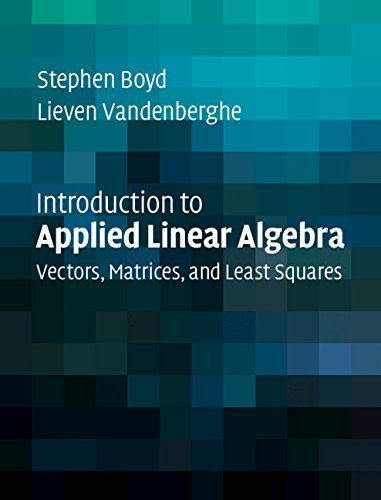8 Basic Linear Algebra Books That Shape Experts' Understanding
Explore Basic Linear Algebra books recommended by Gilbert Strang, Trevor Hastie, and top mathematicians to boost your learning.


What if the path to mastering Basic Linear Algebra wasn't about memorizing formulas but about uncovering the core ideas that power countless applications? Linear algebra shapes everything from data science to engineering, yet many struggle to find books that truly clarify its essence. Now, with guidance from renowned scholars like Gilbert Strang and Trevor Hastie, the journey becomes clearer.
Gilbert Strang, whose MIT lectures have captivated millions, brings decades of teaching to accessible texts that connect theory with real-world uses. Meanwhile, Trevor Hastie, a pioneer in statistics and machine learning, highlights books that bridge foundational math with modern data science challenges. Their insights spotlight books that transform abstract concepts into practical knowledge.
While these expertly curated books provide proven frameworks, readers seeking content tailored to their specific background, skill level, and learning goals might consider creating a personalized Basic Linear Algebra book that builds on these insights to accelerate understanding and application.
Recommended by Trevor Hastie
American statistician and computer scientist
“'The kings of convex optimization have crossed the quad and produced a wonderful fresh look at linear models for data science. While for statisticians the notation is a bit quirky at times, the treatise is fresh with great examples from many fields, new ideas such as random featurization, and variations on classical approaches in statistics. With tons of exercises, this book is bound to be popular in the classroom.'”
by Stephen Boyd, Lieven Vandenberghe··You?
by Stephen Boyd, Lieven Vandenberghe··You?
Stephen Boyd and Lieven Vandenberghe bring their extensive academic and practical expertise to this book, designed to introduce you to applied linear algebra without assuming prior knowledge. You’ll explore vectors, matrices, and least squares through examples tied directly to engineering, data science, and machine learning, making abstract concepts tangible. For instance, the chapters on random featurization and variations on classical statistical methods offer fresh perspectives that challenge conventional approaches. If you’re aiming to ground yourself firmly in the mathematics behind modern applications, this text offers a balanced mix of theory and computational exercises to build your skills methodically.
by Gilbert Strang··You?
by Gilbert Strang··You?
After decades of teaching at MIT, Gilbert Strang developed this edition to reflect the evolving role of linear algebra in fields such as engineering, economics, and data science. You learn to understand matrix factorizations deeply, moving from foundational concepts like independent columns and rank to applications in optimization and machine learning. The book’s unique approach introduces key ideas early, such as column spaces, enabling you to build intuition alongside formal techniques. It suits those aiming to master linear algebra’s core tools and apply them to quantitative problem-solving, especially in data-driven contexts.
This tailored book explores the intricate world of linear operators within basic linear algebra, crafted to match your background and learning goals. It examines fundamental concepts such as operator definitions, properties, and their role in vector spaces, while gradually unlocking more advanced topics like spectral theory and operator decompositions. By focusing on your specific interests, it reveals how linear operators serve as a bridge between abstract theory and practical applications, fostering a deeper understanding that aligns with your pace and prior knowledge. This personalized approach ensures you engage deeply with the material that matters most for your development in linear algebra.
by Sheldon Axler··You?
by Sheldon Axler··You?
Sheldon Axler, Dean of the College of Science & Engineering at San Francisco State University, brings his extensive academic expertise to this textbook designed for advanced undergraduates and graduate students. He rethinks traditional linear algebra teaching by postponing determinants until later chapters, instead emphasizing the structure of linear operators on finite-dimensional vector spaces. You will delve into vector spaces, linear maps, eigenvalues, inner-product spaces, and the spectral theorem, guided by carefully motivated concepts and simplified proofs. For example, new chapters on product, quotient, and dual spaces expand your understanding, supported by over 300 exercises that encourage hands-on learning. This book suits you if you seek a deep conceptual grasp rather than computational shortcuts.
by Gilbert Strang··You?
by Gilbert Strang··You?
Gilbert Strang has been teaching linear algebra at MIT for over fifty years, and his deep commitment to making this subject accessible shines through in this book. You’ll start by exploring independent columns in small matrices, which builds a solid, intuitive grasp of linear combinations and rank before moving into solving linear equations and understanding orthogonality. The book also covers more advanced topics like eigenvalues and singular value decomposition, tying them to applications like image compression and differential equations. Along the way, you get clear explanations and exercises that suit anyone working with data, whether your background is math-heavy or not.
by Gilbert Strang··You?
by Gilbert Strang··You?
Unlike most basic linear algebra texts that dwell heavily on proofs, Gilbert Strang’s approach focuses on fostering understanding through clear explanations and practical applications. Strang, a distinguished MIT professor and Rhodes Scholar, guides you through concepts like vector spaces starting in Chapter 2, emphasizing intuition over rote deduction. You'll explore how theory connects with real-world problems, making the material accessible whether you lean toward pure or applied mathematics. This book suits anyone serious about grasping the subject deeply, from students to professionals seeking a solid conceptual foundation without getting lost in formalism.
by TailoredRead AI·
by TailoredRead AI·
This tailored book explores practical linear algebra techniques specifically curated for data science applications. It covers fundamental concepts such as vectors, matrices, and eigenvalues, while delving into their direct use in data analysis, machine learning, and optimization problems. The content examines how these mathematical tools underpin key algorithms and data transformations, providing clear explanations that match your background and learning goals. By offering a personalized pathway through complex topics, this book focuses on your interests and accelerates your mastery, connecting theoretical ideas with hands-on data science challenges. Its tailored approach reveals insights that make linear algebra accessible and relevant to your unique objectives in the field.
by Gilbert Strang··You?
by Gilbert Strang··You?
Drawing from over fifty years teaching linear algebra at MIT, Gilbert Strang crafted this textbook to bridge core linear algebra concepts with modern data science techniques. You'll explore foundational topics like singular value decomposition and special matrices alongside deep learning essentials such as neural network architecture and backpropagation. The book’s detailed chapters on optimization and stochastic gradient descent provide practical insight into how linear algebra powers machine learning algorithms. If you’re diving into data-driven fields or seeking to strengthen your mathematical toolkit for AI, this book offers a rigorous yet accessible path.
by Ivan Savov··You?
by Ivan Savov··You?
When Ivan Savov wrote this book, his 15 years of tutoring and advanced degrees in engineering, physics, and computer science shaped a unique approach that goes beyond memorizing formulas. You’ll uncover how computational techniques in linear algebra connect deeply with geometric intuition and theoretical roots, all presented through clear definitions, diagrams, and practical examples. The book even guides you through using the SymPy computer algebra system to handle matrix computations efficiently. If you want to build a solid foundation for fields like machine learning or quantum mechanics, this text offers a serious yet accessible path to mastering the core concepts.
by Kuldeep Singh··You?
by Kuldeep Singh··You?
What started as Kuldeep Singh's extensive teaching experience at the University of Hertfordshire evolved into a detailed guide that breaks down linear algebra into manageable, stepwise lessons. You’ll find clear explanations paired with numerous worked examples and exercises drawn from real university exams, making abstract concepts like vector spaces and eigenvalues more approachable. Singh also enriches the material with historical context about key mathematicians and practical insights from professionals applying linear algebra in diverse fields. If you want to build a solid foundation with hands-on practice and understand the subject's relevance beyond theory, this book is tailored for you.
Get Your Custom Basic Linear Algebra Guide Fast ✨
Skip generic advice. Receive focused Basic Linear Algebra strategies tailored to you in just 10 minutes.
Trusted by mathematicians and data scientists worldwide
Conclusion
This collection reveals a few clear themes: first, the importance of grasping fundamental concepts before diving into applications; second, the value of bridging theory with computational tools and real-world problems; and third, the benefit of perspectives that connect basic linear algebra to data science and AI.
If you're tackling foundational challenges, start with books like Linear Algebra Done Right or Linear Algebra by Kuldeep Singh for clear, stepwise learning. For rapid application, combining Introduction to Applied Linear Algebra with Linear Algebra and Learning from Data offers practical frameworks tied directly to modern fields.
Alternatively, you can create a personalized Basic Linear Algebra book to bridge the gap between general principles and your specific situation. These books can help you accelerate your learning journey by delivering expert knowledge tailored to your goals.
Frequently Asked Questions
I'm overwhelmed by choice – which book should I start with?
Start with Introduction to Linear Algebra by Gilbert Strang for a solid foundation, then explore applied titles like Introduction to Applied Linear Algebra to see concepts in action.
Are these books too advanced for someone new to Basic Linear Algebra?
Several books, like Linear Algebra for Everyone and Kuldeep Singh’s Linear Algebra, are designed with accessibility in mind, making them suitable for beginners.
What's the best order to read these books?
Begin with conceptual texts such as Linear Algebra Done Right, then move to applied books like Linear Algebra and Learning from Data to connect theory with practice.
Should I start with the newest book or a classic?
Classics like Strang’s Introduction to Linear Algebra offer timeless clarity, while newer books provide fresh perspectives and applications; combining both enriches learning.
Which books focus more on theory vs. practical application?
Linear Algebra Done Right emphasizes theory and proofs, whereas Introduction to Applied Linear Algebra and Linear Algebra and Its Applications focus on real-world uses.
Can personalized books complement these expert recommendations?
Yes. While these expert books lay the foundation, personalized books tailor content to your background and goals, bridging theory with your specific needs. Consider creating a personalized Basic Linear Algebra book for focused learning.
📚 Love this book list?
Help fellow book lovers discover great books, share this curated list with others!
Related Articles You May Like
Explore more curated book recommendations







